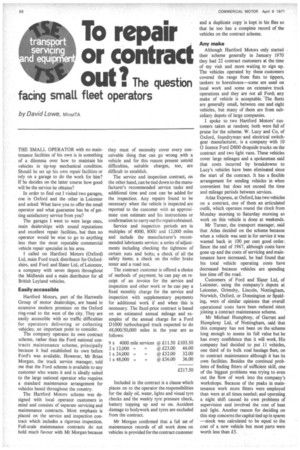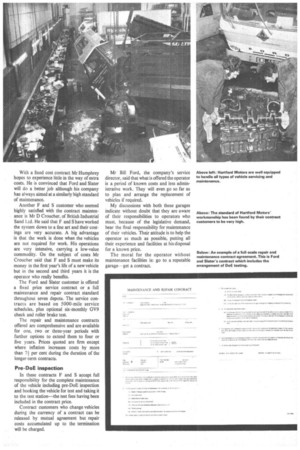To repair or contract
Page 58

Page 59

If you've noticed an error in this article please click here to report it so we can fix it.
out? The question
facing small fleet operators
by David Lowe, MInstTA
THE SMALL OPERATOR with no maintenance facilities of his own is in something of a dilemma over how to maintain his vehicles in tip-top mechanical condition. Should he set up his own repair facilities or rely on a garage to do the work for him? If he decides on the latter course how good will be the service he obtains?
In order to find out I visited two garages, one in Oxford and the other in Leicester and asked: What have you to offer the small operator and what guarantee has he of getting satisfactory service from you?
The garages I went to were large ones, main dealerships with sound reputations and excellent repair facilities, but then no operator would be wise to go to anything less than the• most reputable commercial vehicle repair specialist in his area.
I called on Hartford Motors (Oxford) Ltd, main Ford truck distributor for Oxfordshire, and Ford and Slater Ltd, of Leicester, a company with seven depots throughout the Midlands and a main distributor for all British Leyland vehicles.
Easily accessible Hartford Motors, part of the Hartwells Group of motor dealerships, are based in extensive modern premises on the Oxford ring-road to the west of the city. They are easily accessible with no traffic difficulties for operators delivering or collecting vehicles; an important point to consider.
The company operates its own contract scheme, rather than the Ford national contracts maintenance scheme, principally because it had established its own before Ford's was available. However, Mr Brian Morgan, the truck service manager, told me that the Ford scheme is available to any customer who wants it and is ideally suited to the large national operator who requires a standard maintenance arrangement for vehicles based throughout the country.
The Hartford Motors scheme was designed with local operator customers in mind and consists of separate servicing and maintenance contracts. Most emphasis is placed on the service and inspection contract which includes a rigorous inspection. Full-scale maintenance contracts do not hold much favour with Mr Morgan because they must of necessity cover every conceivable thing that can go wrong with a vehicle and for this reason present untold difficulties, suitable charges, too, are difficult to establish.
The service and inspection contract, on the other hand, can be tied down to the manufacturer's recommended service tasks and additional time and cost can be added for the inspection. Any repairs found to be necessary when the vehicle is inspected are reported to the customer with an approximate cost estimate and his instructions or confirmation to carry out the repairs obtained.
Service and inspection periods are in multiples of 4000, 8000 and 12,000 miles and include the manufacturer's recommended lubricants service; a series of adjustments including checking the tightness of certain nuts and bolts; a check of all the safety items; a check on the roller brake tester and a road test.
The contract customer is offered a choice of methods of payment; he can pay on receipt of an invoice for the service and inspection and other work or he can pay a fixed monthly charge for the service and inspection with supplementary payments for additional work if and when this is necessary. The fixed-price contract is based on an estimated annual mileage and examples of the annual charge for a Ford D1000 turbocharged truck expected to do 48,000/50,000 miles in the year are as follows: Included in the contract is a clause which places on to the operator the responsibilities for the daily oil, water, lights and visual tyre checks and the weekly tyre pressure check, battery topping up and so on. Accident damage to bodywork and tyres are excluded from the contract.
Mr Morgan confirmed that a full set of maintenance records of all work done on vehicles is provided for the contract customer and a duplicate copy is kept in his files so that he too has a complete record of the vehicles on the contract scheme.
Any make•
Although Hartford Motors only started their scheme generally in January 1970 they had 22 contract customers at the time of my visit and more waiting to sign up. The vehicles operated by these customers covered the range from flats to tippers, tankers to horesboxes—some are used on local work and some on extensive truck operations and they are not all Ford; any make of vehicle is acceptable. The fleets are generally small, between one and eight vehicles, but many of them are from subsidiary depots of large companies.
I spoke to two Hartford Motors' customers taken at random; both were full of praise for the scheme. W. Lucy and Co, of Oxford, foundrytnair and electrical switchgear manufacturer, is a company with 10 0 licence Ford D800 dropside trucks on the contract and two light vans. These vehicles cover large mileages and a spokesman said that costs incurred by breakdowns to Lucy's vehicles have been eliminated since the start of the contract. It has a flexible arrangement for sending vehicles in when convenient but does not exceed the time and mileage periods between services.
Atlas Express, at Oxford, has two vehicles on a contract, one of them an articulated outfit, which operates round the clock from Monday morning to Saturday morning so work on this vehicle is done at weekends.
Mr Turner, the transport manager, said that Atlas decided on the scheme because when a vehicle was sent in for service it was wanted back in 100 per cent good order. Since the end of 1967, although costs have gone up and the costs of servicing and maintenance have increased, he had found that his total vehicle operating costs have decreased because vehicles are spending less time off the road.
Customers of Ford and Skater Ltd, of Leicester, using the company's depots at Leicester, Grimsby, Lincoln, Nottingham, Norwich, Oxford, or Donnington nr Spalding, were of similar opinions that overall operational costs have been reduced since joining a contract maintenance scheme.
Mr Michael Humphrey, of Garratt and Humphrey Ltd, of Nottingham, said that this company has not been on the scheme long enough. to assess its full value but he has every confidence that it will work. His company had decided to put 11 vehicles, one third of its bulk coal haulage fleet, on to contract maintenance although it has its own facilities. Besides the continual problems of finding fitters of sufficient skill, one of the biggest problems was trying to even out the flow of work into the company's workshops. Because of the peaks in maintenance work more fitters were employed than were at all times needed; and operating a night shift caused its own problems of supervision and involved the cost of heat and light. Another reason for deciding on this step concerns the capital tied up in spares —stock was calculated to be equal to the cost of a new vehicle but most parts were worth less than £5. With a fixed cost contract Mr Humphrey hopes to experience little in the way of extra costs. He is convinced that Ford and Slater will do a better job although his company has always aimed at a similarly high standard of maintenance.
Another F and S customer who seemed highly satisfied with the contract maintenance is Mr D Croucher, of British Industrial Sand Ltd. He said that F and S have worked the system down to a fine art and their costirtgs are very accurate. A big advantage is that the work is done when the vehicles are not required for work. His operations are very intensive, carrying a low-value commodity. On the subject of costs Mr Croucher said that F and S must make its money in the first year's life of a new vehicle but in the second and third years it is the operator who really benefits.
The Ford and Slater customer is offered a fixed price service contract or a full maintenance and repair contract standard throughout seven depots. The service contracts are based on 5000-mile service schedules, plus optional six-monthly GV9 check and roller brake test.
The repair and maintenance contracts offered are comprehensive and are available for one, two or three-year periods with further options to extend them to four or five years. Prices quoted are firm except where inflation increases costs by more than 71 per cent during the duration of the longer-term contracts.
Pre-DoE inspection In these contracts F and S accept full responsibility for the complete maintenance of the vehicle including pre-DoE inspection and booking the vehicle for test and taking it to the test station—the test fees having been included in the contract price.
Contract customers who change vehicles during the currency of a contract can be released by mutual agreement but repair costs accumulated up to the termination will be charged. Mr Bill Ford, the company's service director, said that what is offered the operator is a period of known costs and less administrative work. They will even go so far as to plan and arrange the replacement of vehicles if required.
My discussions with both these garages indicate without doubt that they are aware of their responsibilities to operators who must, because of the legislative demand, bear the final responsibility for maintenance of their vehicles. Their attitude is to help the operator as much as possible, putting all their experience and facilities at his disposal for a known price.
The moral for the operator without maintenance facilities is: go to a reputable garage get a contract.




































































































































